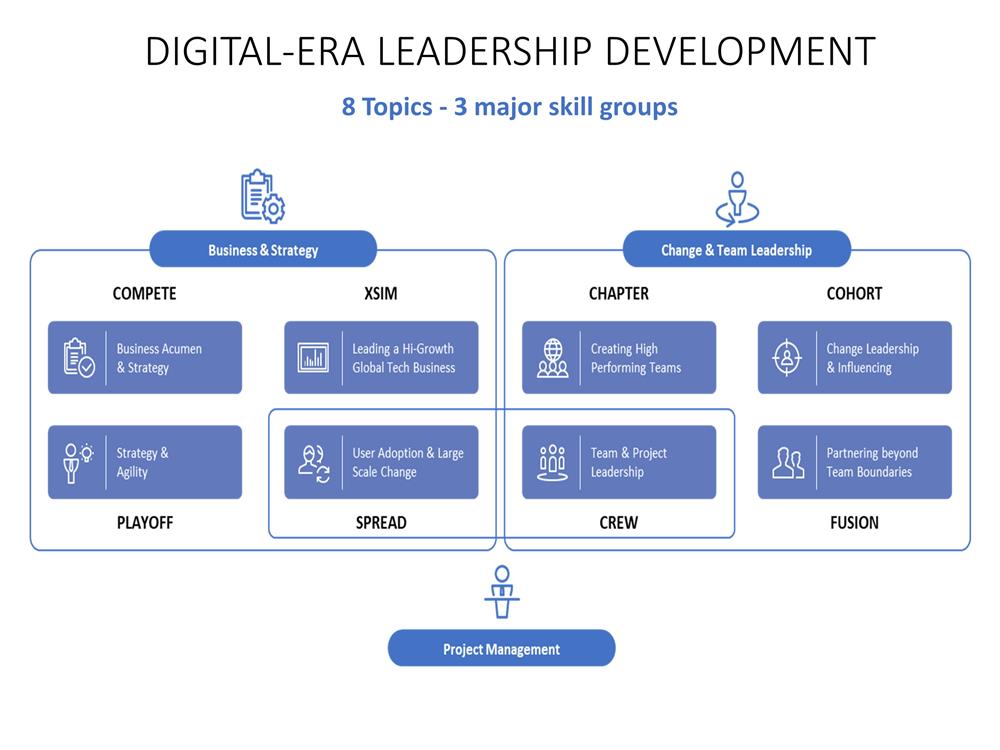The term “Digital-Era Leader” or “Digital-Age Leader” or even “Digital Leader” has become very popular today with though-leaders like McKinsey, Insead, IMD and Gardner all using the term. But what does "Digital Leader" actually mean and what should Leadership Development look like for it?
Digital Leadership
First let’s look at the Digital Leader’s characteristics.
The astute reader might have noticed that we have ducked a more fundamental question - what is leadership? This is for the sake of brevity and focus but, if you want to, you can explore this important topic more here in Do the best leaders just throw the DICE and hope for success?
Some of the proponents of the term Digital Leader focus mostly on a leader’s ability to use and exploit digital technologies effectively. This is good in terms of stressing the importance of basic levels of digital technology competence in areas such as virtual meetings. However I don’t believe leaders need to be experts in Digital Technologies by any means!
Why not?
A leader’s role is mostly in engaging, persuading, directing, coaching and motivating others. Thus a leader who is spending lots of their time using digital technologies might be an effective manager but certainly not an effective leader.
So I think we need a much broader definition of "digital leader"!
Something along the lines of “a leader who is comfortable and confident in the digital interconnected world of organizations and what this means in terms of people, process and organizations and more importantly – change”.
In other words a key part of the job of digital leadership is leading digital transformation.
In our view there are 3 core topics which a Digital-Leader must master – as shown in the diagram at the top of the page:
- Business Skills
- Change and Teams
- Execution
These three core areas resonate with research by Deloitte, The Leadership Premium: How Companies Win the Confidence of Investors, which I reported on in 2017
Core Topic#1: Business Skills
Without good Commercial Acumen, Business Strategy, Agility and Operational Leaderships skills a Digital Leader will simply not have an adequate grasp of the essential “Why’s and How’s” of many of the challenges they will face.
Core Topic#2: Change and Teams
To lead Digital Transformation a leader will need to be both a change agent and a leader of teams and individuals otherwise they will not be able to impact the status quo.
Core Topic#3: Execution
It is all very well creating a great business case and a great change/project plan but unless a leader can actually deliver, it all counts for nothing.
As Mark Hurd (CEO of Oracle) says “Without execution, 'vision' is just another word for hallucination. “
Digital Leadership Development
Now that we have put some meat on the bones of what an effective Digital Leader looks like we need to define how their leadership development can be most effectively supported.
In my opinion, Digital Leadership Development needs to be a well-crafted blend and balance of the following ingredients:
- Personal Learning (i-learning) versus Collective Learning (we-learning)
- Virtual Team Learning (same-time different place) versus Co-located Team Learning (same-time same place)
- Continuous Self-Reflection versus Coaching and Mentoring
Professionally facilitated team-based business simulations can provide an excellent core platform to develop the 3 core topics we identified in a modern blended way:

In a previous article I have defined what I believe are the four critical ingredients for effective learning via Business Simulations:
- Experiential
- Social
- Scenarios
- Gamification
Experiential means that people are learning by doing rather than just watching or listening; Social means that the experiences are shared and discussed with colleagues in teams (which requires facilitation); Scenarios means that participants face credible and challenging problems and Gamification means that participants can track their progress and compare how well these are doing against colleagues playing in other teams.
- Simulations such as XSIM and COMPETE address the Business Skills of the Digital Leader
- Simulations such as COHORT and CHAPTER address the Change and Teams Skills of the Digital Leader
- Simulations such as CREW and SPREAD address the Execution Skills of the Digital Leader
Such simulations can be delivered virtually and/or co-located and can be easily complemented by Personal Learning Apps such as SCENES and Self-Reflection tools such as SENSEI to ensure the learning is on-going and sticky!